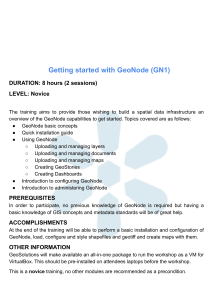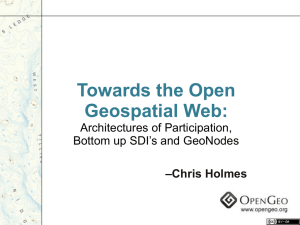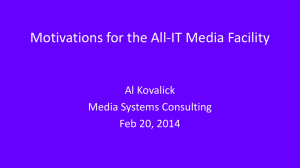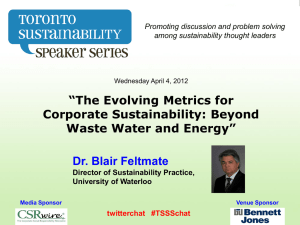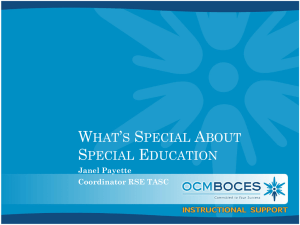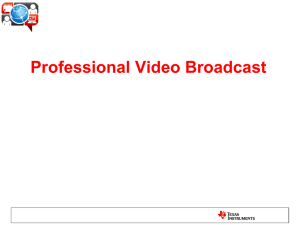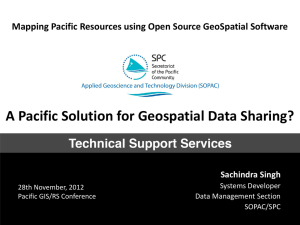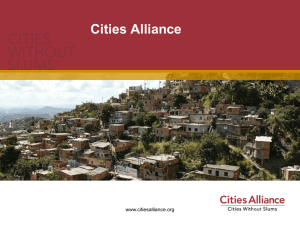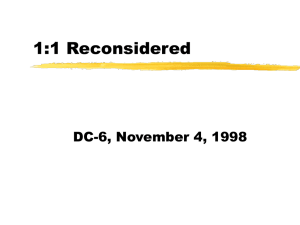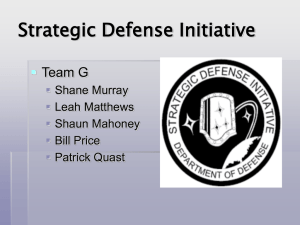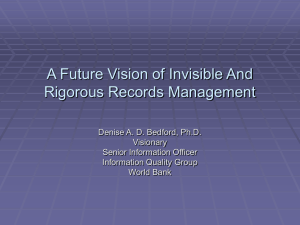geonode-overview
advertisement
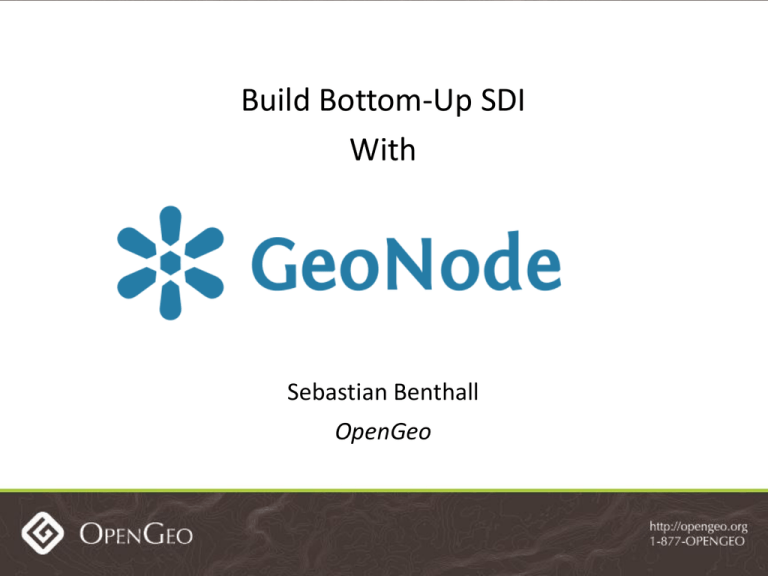
Build Bottom-Up SDI With Sebastian Benthall OpenGeo Spatial Data Infrastructure (SDI) Spatial Data Infrastructure (SDI) “[Spatial Data Infrastructure] provides a basis for spatial data discovery, evaluation, and application for users and providers within all levels of government, the commercial sector, the non-profit sector, academia and by citizens in general.” – SDI Cookbook The theory of SDI developed before we learned what was possible with the Internet Imagine... ...what an ideal SDI would be like Imagine... ...an SDI that makes uploading, sharing, and working with data as easy as blogging Publishing data Anthony has some spatial data and wants to display it as part of a blog post. Publishing data Anthony uploads it to a public SDI, styles it, provides a background, and then puts a map widget on his blog. Publishing data Meanwhile, the data, style, and map remain available on the public SDI for others to use. Metadata and reputation The World Organization tells Cameron, their consultant, to put data she has gathered on their SDI. Metadata and reputation Other users notice mistakes in the metadata. They notify Cameron and give it a low rating. Metadata and reputation Cameron fixes the mistakes, and the other users rate the data more highly. Her reputation on the SDI improves. Federated search A regional Health agency and a regional Transit agency have separate SDI systems. Federated search Tom, a GIS analyst doing research, seeks out correlations between health and bicycle routes Federated search Tom searches for data in a single federated index and downloads the data as a batch. Vision Theory How do you make an SDI that's as compelling as modern, widely-used web services? Make an SDI using the best practices of these web services and projects General Principles Grow Bottom Up Align Incentives through Openness Build it for Casual Users Features, not Policies Grow Bottom-Up Reduce barriers to participation as much as possible. Be useful (if imperfect) as fast as possible. 04/26/10 Grow Bottom-Up Start with data. Let users work with it. Generate metadata as needed. 04/26/10 Align Incentives... Align incentives for contribution and use so growth is natural. Align Incentives... Reward data providers for good contributions Encourage users to contribute back Make value of service transparent to system providers ... through Openness Provide a reason to participate Reward collaboration Make it as transparent as possible Build it for Casual Users Using Spatial Data Infrastructure should not require expertise Build it for Casual Users Reading documentation is too much work. The burden is on the system developers to make it intuitive to use. Features, not Policies If SDI technology requires No overhead or compromises there will be No organizational resistance Features, not Policies Look for and implement smart technical solutions to legitimate organizational concerns. Vision Theory Context is a new software project to build this SDI Founders Want GeoNode for disaster reduction Global Facility for Disaster Reduction and Recovery (GFDRR) and World Bank UN International Strategy for Disaster Reduction (UNISDR) Builders Not-for-profit social enterprise Builds and supports open source geospatial software Aims to build the Open Geospatial Web GeoNode is open source. Install it for free. Contact the developers directly. Collaborate with us and each other. Build local capacity and be independent of any vendor. We will soon release GeoNode 1.0 Vision Theory Context What does GeoNode actually do ? Give a reason to participate A major problem with SDI is that people lack incentives to use it Problems with Portals No benefit to registering Few real users No recognition or reward for the effort Uses stick, not carrot SDI GIS SDI GIS Embed SDI in the real work of GIS practitioners, and it will have more impact. Provides styling and cartography tools Users can use the tools on data they upload GeoNode provides a reason to participate Map composer makes Maps Maps are an important content type They bind together ecosystem of geospatial content Maps, Data and Users form an web to be browsed Generic search engines (like Google, Bing) can crawl and rank these pages. Users Have Identity People fill out user profiles to establish identity on the web Profiles are also useful data Meanwhile, Metadata Pain Good metadata for geospatial data is important but hard to produce. GeoNode has user profiles and features them prominently Those profiles have ISO metadata fields within them Metadata Made Easy Metadata Published Metadata is published with open standard CSW using GeoNetwork Open standards and API's Data published by GeoServer in OGC Services: WMS, WFS, WCS Metadata published by GeoNetwork in CSW KML for Google We use open standards for data access. GeoNode also has open APIs HTTP HTTP HTTP GeoNode's components interact through clean API's Others can build apps around GeoNode Or swap out components (Drupal...?) Make Content Portable Let Users Control Content Content owners control access with easy user interface Deep data security extends to OGC services We are building GeoNode to accommodate any institution's access policy All these features are included in the current 1.0 release candidate. Vision Theory Context Reality Future We have even more ambitious plans for GeoNode moving forward The partnership investing in GeoNode is growing The roadmap expands with the vision and needs of its partners Use the Social Network The Social for Search 04/26/10 04/26/10 Record statistics on usage Let users comment on and rate content Use that information to improve search results The Social for Quality Ratings affect user reputation Will encourage quality content on SDI Groups Matter 04/26/10 04/26/10 Organizations will have a presence Allows organizational endorsement of data SDI Features There are also features specific to Spatial Data Infrastructure on our roadmap Editing Federation 04/26/10 Frequently Asked Questions What's it made of? HTTP HTTP HTTP 04/26/10 What about INSPIRE? GeoServer needs WMS 1.3 to meet INSPIRE standards OpenGeo has found partners to fund this development It is coming soon Open Data Skepticism Isn't GeoNode an open data platform? Doesn't open data raise concerns about data quality and data security? Open Data Optimism Yes, GeoNode is designed to promote open data. Open Data Optimism Features like User reputation Organizational endorsement Flexible security address data quality concerns Open Data Optimism GeoNode supports the continuum of openness with a common platform for institutional GIS and neogeography What about Features X,Y,Z? We welcome your investment in new GeoNode features and involvement in the developer community. GeoNode Action How to Try It Play with the live public demo at http://demo.geonode.org (Warning: Unstable) How to Install It Follow instructions in README at http://github.com/geonode/geonode Email questions to mailing list geonode@librelist.com Talk to developers in #geonode IRC channel Tell us about your experience geonode@librelist.com Your comments will help us Improve it How to Buy It If you want to use GeoNode in production you may want professional quality support How to Buy It Contact OpenGeo at inquiry@opengeo.org Or visit our booth How to Buy It (OpenGeo has a network of regional partners and is looking for others) How to Invest In It Is GeoNode perfect for you except that it needs one more feature? How to Invest in It Contact OpenGeo at inquiry@opengeo.org Or visit our booth How to Join It • • • • Contributing Organizations: OpenGeo, World Bank, Civic Works We hope others will join the developer community Patches welcome Community growth a priority Developer Community • • • • Join Us! Email geonode@librelist.com to join the mailing list IRC: #geonode See the issue tracker at – http://projects.opengeo.org/CAPRA If you have any questions about GeoNode Feel free to email seb@opengeo.org Or ask them now. Any questions?
